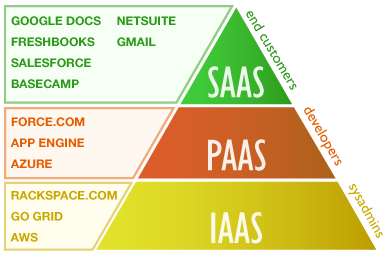3 Types of Cloud Services Introduction
Cloud computing has three most common types of cloud services to offer. Depending on the needs of users,any type of cloud computing service is used either individually or in combination with others. The following is a brief introduction to the three cloud service types,namely,SaaS,PaaS and IaaS.
Software as a service (SaaS)
SaaS is also known as “on-demand software”. Users of SaaS rather than fully buy the license of various software hire the software at regular intervals and use it through an Internet browser. The variety of software provided by SaaS is very broad. There are a number of software used by SaaS from companies such as ezTalks Video Conferencing that employs in content management,human resources management,accounting,ERP,customer relationship management and other relevant areas.The software-as-a-service type of cloud computing grows very quickly,while the largest market for software-as-a-service electricity is customer relationship management.In this service model,the cloud-based applications are offered to the customer as a service on request. It is a single instance of the service running on remote computers “in the cloud”,owned and operated by others,and connected to the users' computers over the Internet and typically a web browser. Social networking sites like Facebook,Twitter,Flickr and Google are all examples of SaaS,although users are able to access the services through any Internet-enabled device.
Platform as a service (PaaS)
PaaS provides computers platforms for users of cloud computing. It is also the link between the other two services provided by cloud computing; SaaS and IaaS.
A normal computer requires a computer platform that contains hardware architecture along with a framework of software. Such a platform is the basis of the collaboration of hardware and software,which includes the operating system of the operating system,architecture and languages. When it comes to cloud computing,in the absence of a real computer,it is platform as a service that provides users with everything that is required to compose a computing platform.
Some of the facilities that PaaS provides include hosting,implementation,test and application development,and application design. In addition,cloud service providers that offer PaaS include a set of features to design,test,implement,manage,and run applications. All these facilities can be used by both individual and business customers,by subscribing to a single package with all the features offered.
The platform-as-a-service (PaaS) model is a level above the software as a service setup and provides hardware,network and operating system so that a customer can design their own application and software. In order to meet the requirements of applications such as scalability and manageability,a predefined combination of operating system OS and application servers from PaaS vendors. For example,at any stage of the process to develop,test and ultimately host their sites,Web developers can use individual PaaS environments.
Infrastructure as a Service (IaaS)
IaaS is the third type of computing across the cloud. Just like PaaS and SaaS,different software and hardware devices deliver on a cloud platform,while IaaS provides a virtualized platform. The process of hardware virtualization shows the users only the abstract computing platform instead of the physical functions. Such virtualization results in the creation of a so-called "virtual machine monitor" or "hypervisor",which is the creation of the third part of the cloud computing,i. Interface as a service.
Infrastructure available to users of Interface as a Service includes software,servers,network devices,and data center space. The cost incurred by customers' cloud service providers typically depend on the amount of activity performed by the user and is therefore not set. However,there is a minimal amount of charge depending on the number of facilities that a user has subscribed to.
Infrastructure-as-a-Service (IaaS) is a basic computing and storage space provided by a standardized service over the network. This model has made the workload easier by consolidating and providing data center space,storage systems,and so on. In addition,the customer can develop and install their own operating systems, software and applications. While some argue that Infrastructure as a Service (IaaS) is closely similar to Desktop-as-a-Service (DaaS), in reality, they differ significantly. While DaaS focuses on delivering virtual desktop environments to end-users, IaaS provides a broader set of virtualized infrastructure components, allowing users to build and manage their own virtual machines and associated resources.
There are a number of advantages of using cloud computer technology. However,any type of cloud service comes with its own set of advantages and disadvantages. In order to make the right decision, it is imperative that users carefully weigh the pros and cons.